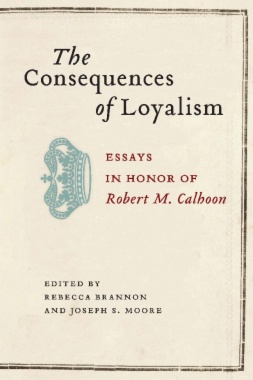Scholars build on Calhoon's work and consider Loyalism's relationship to conflict resolution, imperial bureaucracy, and identity creation
Since the 1970s scholars have regarded Robert M. Calhoon as an invigorating and definitive force when it comes to the study of American Loyalism. His decades-long work redefined the Loyalists' role in the American Revolution from being portrayed as static characters opposing change to being seen eventually as reactionary actors adapting to a society in upheaval. Loyalists were central to the Revolution, and Calhoon and these authors argue that they were not so different in ideology from their Patriot neighbors—except occasionally when they were.
The Consequences of Loyalism, Rebecca Brannon and Joseph S. Moore seek to provide an understanding of Calhoon's foundational influence and the development continuing in the wake of his prolific career. This volume unites sixteen previously unpublished essays that build on Calhoon's work and consider Loyalism's relationship to conflict resolution, imperial bureaucracy, and identity creation. In the first of two sections, established and rising scholars discuss the complexities of Loyalist identity, while considering Calhoon's earlier work. In the second section, scholars work from Calhoon's later publications to investigate Loyalism in terms of the consequences of Loyalism for the Loyalists, and for the legacy of the Revolutionary War.
The Consequences of Loyalism offers a bold, new reinterpretation of Loyalism. This book brings Loyalist dilemmas alive, digging into their personalities and postwar routes. The essays discuss not only Loyalists' experiences during the Revolution, but also their coping and even reintegration in the aftermath. Loyalists from all facets of society fought for what they considered their home country: women wrote letters, commanders took to the battlefield, and thinkers shaped the political conversation. This volume complements Calhoon's influential work, expands the scope of Loyalist studies, and opens the field to a deeper, perhaps revolutionary understanding of the king's men.
- Cover�������������������������������
- The Consequences of Loyalism����������������������������������������������������������������������������������������������������
- Title�������������������������������
- Copyright�������������������������������������������
- Dedication����������������������������������������������
- Contents����������������������������������������
- List of Illustrations�������������������������������������������������������������������������������
- Preface�������������������������������������
- Acknowledgments�������������������������������������������������������������
- Introduction����������������������������������������������������
- I. Perceptions����������������������������������������������������������
- “The Success of Either Lies in the Womb of Time” The Politics of Loyalty in the Revolutionary Chesapeake����������������������������������������������������������������������������������������������������������������������������������������������������������������������������������������������������������������������������������������������������������������������������������������������������������������������������������������
- Reexamining Loyalist Identity during the American Revolution����������������������������������������������������������������������������������������������������������������������������������������������������������������������������������������������������
- Constructing Female Loyalism(s) in the Delaware Valley Quaker Women Writers of the American Revolution����������������������������������������������������������������������������������������������������������������������������������������������������������������������������������������������������������������������������������������������������������������������������������������������������������������������������������
- Loyalist Refugee Camp A Reinterpretation of Occupied New York, 1776–83����������������������������������������������������������������������������������������������������������������������������������������������������������������������������������������������������������������������������������
- Before and After Ramsour’s Mill Cornwallis’s Complaints and Historical Memory of Southern Backcountry Loyalists�������������������������������������������������������������������������������������������������������������������������������������������������������������������������������������������������������������������������������������������������������������������������������������������������������������������������������������������������������������
- Pragmatism and Principle Capt. Alexander Chesney and the Revolutionary War in South Carolina����������������������������������������������������������������������������������������������������������������������������������������������������������������������������������������������������������������������������������������������������������������������������������������������������
- “New Hope” in Shelburne, Nova Scotia Loyalist Dreams in the Journal of British Engineer William Booth, 1780s–90s����������������������������������������������������������������������������������������������������������������������������������������������������������������������������������������������������������������������������������������������������������������������������������������������������������������������������������������������������������������
- Exploring the Landscape of Slavery in Loyalist Era Nova Scotia����������������������������������������������������������������������������������������������������������������������������������������������������������������������������������������������������������
- II. Moderation����������������������������������������������������������
- Lawyering for Loyalists in the Post–Revolutionary War Period����������������������������������������������������������������������������������������������������������������������������������������������������������������������������������������������������
- “That Abundant Infamous Roach” Breed and Ruth Batcheller, Moderate Loyalism, Language, and Domestic Power in Revolutionary New Hampshire����������������������������������������������������������������������������������������������������������������������������������������������������������������������������������������������������������������������������������������������������������������������������������������������������������������������������������������������������������������������������������������������������������������������������������������
- The Nonjuror Problem in Pennsylvania����������������������������������������������������������������������������������������������������������������������������
- Justice and Moderation? The Reintegration of the American Loyalists as an Episode of Transitional Justice�������������������������������������������������������������������������������������������������������������������������������������������������������������������������������������������������������������������������������������������������������������������������������������������������������������������������������������������
- America’s Revolutionary Experience with Transitional Justice����������������������������������������������������������������������������������������������������������������������������������������������������������������������������������������������������
- Plagiarism and the Nationalist Uses of Loyalist History Alexander Hewatt and David Ramsay�������������������������������������������������������������������������������������������������������������������������������������������������������������������������������������������������������������������������������������������������������������������������������������������
- Postwar Loyalist Hopes To Be “Parts and Not Dependencies of the Empire”�������������������������������������������������������������������������������������������������������������������������������������������������������������������������������������������������������������������������������������
- Afterword Robert McCluer Calhoon–The Politics of Moderation and a Passion for Teaching
- Notes�������������������������������
- List of Contributors����������������������������������������������������������������������������
- Index�������������������������������

